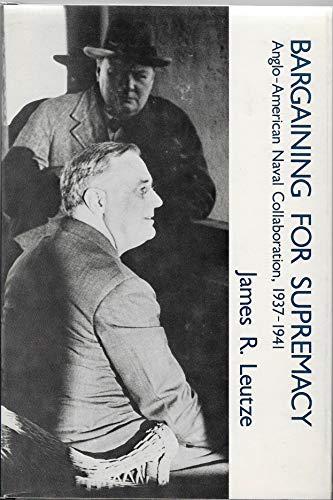
Bargaining for Supremacy
by James R. Leutze
"Anglo-American Naval Collaboration, 1937-1941"
Popularity
2.46 / 5
* A book's popularity is determined by how it compares to all other books on this website.
Where to buy?
Buy from Amazon* If you buy this book through the link above, we may receive a small commission at no extra cost to you.
Bargaining for Supremacy by James R. Leutze
Details
War:
World War II
Perspective:
Researcher
True Story:
Yes
Biography:
No
Region:
Europe
Page Count:
344
Published Date:
1977
ISBN13:
9780807813058
Description
Brief Summary
Bargaining for Supremacy by James R. Leutze delves into the high-stakes negotiations and strategic planning between the United States and Britain in the lead-up to America's entry into World War II. It focuses on the military and diplomatic efforts by which American planners aimed to assert their influence over the Atlantic, pushing Britain to redirect some of its naval forces to the Pacific. This maneuvering took place in a tense geopolitical climate, with Churchill willing to make significant sacrifices in the hope of reasserting British power after the war. Leutze's work draws back the curtain on the secret agreements and power dynamics that shaped a critical period in history.
Main Themes and Topics
The primary themes in Bargaining for Supremacy revolve around military strategy, diplomacy, and the complex interplay of power between wartime allies. Leutze explores the strategic calculations that characterized pre-World War II allied relations, highlighting the tension between American and British military planners. The book examines the United States' ambitions to expand its influence and the impact of these ambitions on British strategic decisions. By focusing on the secret agreements made between these two powers, Leutze offers a detailed study of alliance politics and the delicate balance of authority within the coalition that eventually confronted the Axis powers.
Writing Style and Tone
James R. Leutze writes with a scholarly rigor that immerses the reader in the complex world of international diplomacy and military strategy. His tone is analytical, dissecting diplomatic communications and military plans with precision. Leutze's narrative is well-researched and dense with historical detail, catering to readers with an interest in military history and international relations. Despite the intricate subject matter, his clear and organized presentation makes the complex themes accessible to both historians and lay readers interested in the dynamics of global power during a pivotal moment in history.
Criticism
While Bargaining for Supremacy is celebrated for its detailed research and insightful analysis, some readers may find the dense exposition challenging. The book's focus on the high-level strategic planning and technical aspects of wartime negotiations may not appeal to those looking for a more narrative-driven or personal recounting of events. Furthermore, the specialized nature of the subject matter might limit its appeal to readers without a prior interest in military or diplomatic history.









